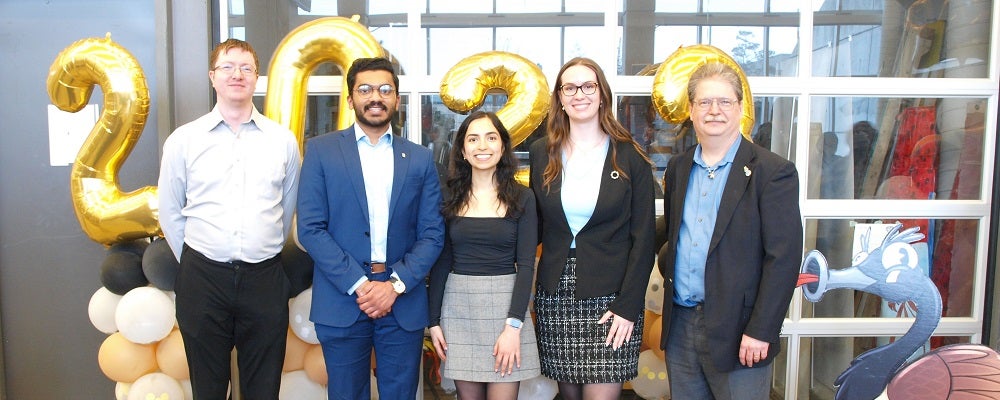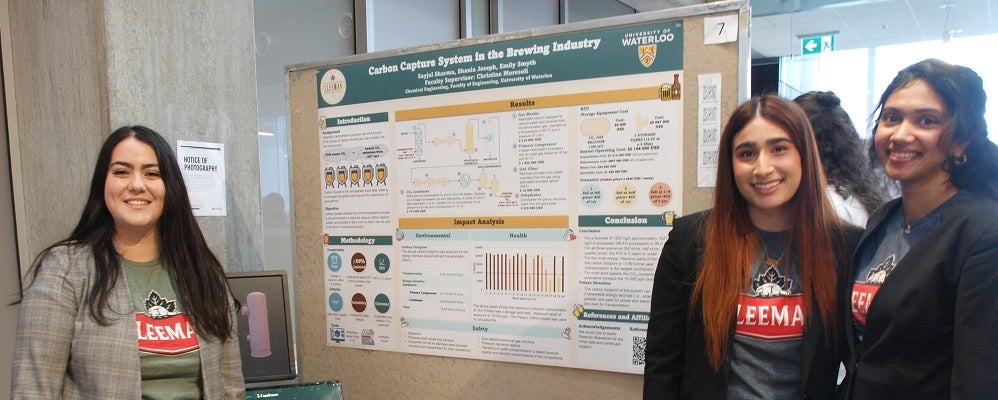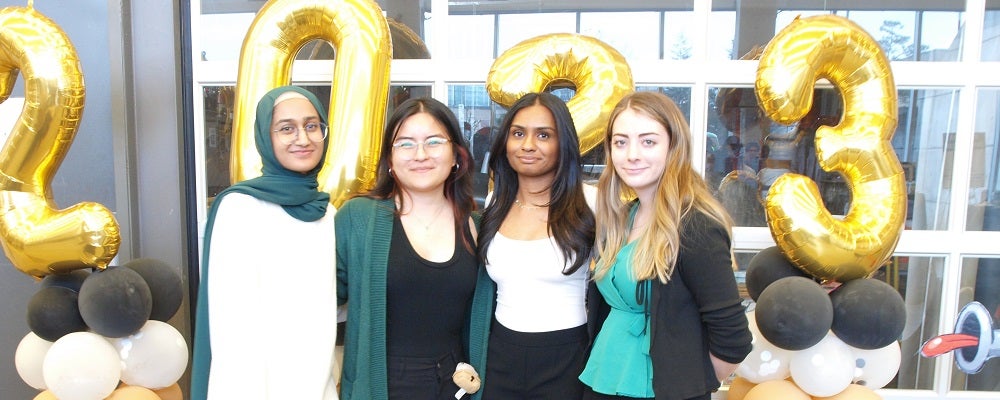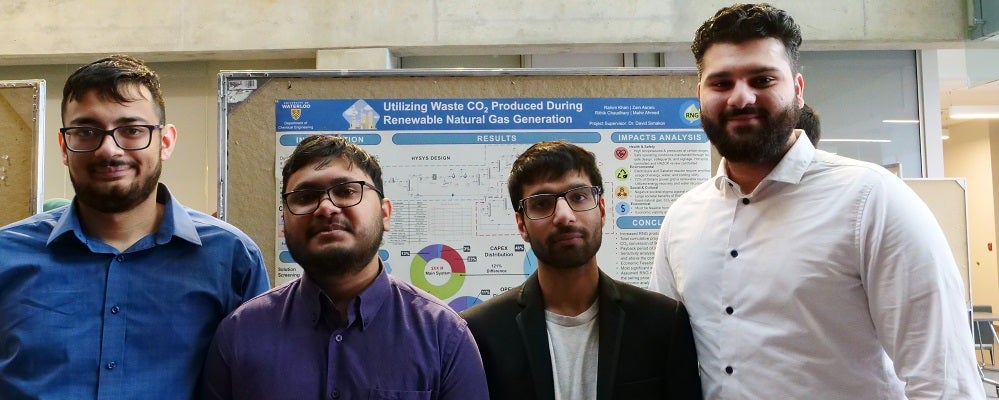
Nicholas Somer from Ontario Tech University, Team 16 members Abin Varghese, Amrita Kaur, Shannon McNeil and Dr. Glenn Harvel also from Ontario Tech University
It’s the most wonderful time of the year! Fourth-year students leverage their creativity and technical skills to advance new ideas and novel technologies in their Capstone Design Projects.
Chemical Engineering’s Capstone Design Symposium took place in the event space in E7 on March 27th. Eventgoers included industry partners, faculty, friends, and family of the students-all eager to see the results of the fourth-year students’ innovations.
Some of this year’s Capstone Design Projects included designing industrial-scale flow batteries to fulfill peaking demand for green energy; water purification systems for an Indigenous Community; a proposal to create a plant that manufactures sustainable aviation fuel; and capturing microplastics in wastewater treatment.
Sustainability was a theme that ran through many of the Design Projects. Team 5 designed an economical recycling process for Styrofoam and was the winner of the Faculty of Engineering Capstone Design Sustainable Development Award for the Department of Chemical Engineering.

Team 5 members Alexa Salvatore, Sawyer d’Entremont, Aleksi Luoma and Guenevere O’Hara
Their Capstone Design Project contributes to the creation of a circular economy which is the foundation of sustainability.
“This project is the culmination of all we have learned in our core and lab courses to achieve sustainable Chemical Engineering designs. We were able to design a recycling process for expanded polystyrene which is not currently recycled,” said team members.
Team 7 was also a Capstone award winner. Their project focused on improving one of Canada’s most valued and beloved products-Canadian beer! During the fermentation process in the production of beer, CO2 is emitted into the environment. The team partnered with Sleeman Breweries and aimed to reduce CO2 emissions by modelling a carbon capture system.

Team 7 members Shania Joseph, Emily Smyth and Sayjal Sharma
“I chose to study Chemical Engineering because I wanted to make an impact and reduce our carbon footprint, so this project and win is a full circle moment for me,” said team member Sayjal Sharma.
Team 22 was also awarded five hundred dollars for their project which focused on sustainable agriculture. They worked closely with University of Waterloo’s Sustainability Office to create a hydroponics unit that would grow produce for campus food services saving the University thousands of dollars annually.

Team 22 members Nusayba Sultana, Harumi Diaz, Eveline Thevasagayam and Ally Villeneuve
“We were able to apply our engineering knowledge and decision-making process, as well as the skillset we learned in our co-op terms to create our project. We’re thankful to the Sustainability Office, their support of our project is representative of the University’s commitment to Capstone,” reflected team members.
Team 16 whose project was entitled “Radioactive Species Capture Via Bubble Column for Nuclear Power Plant Decommissioning” won the prestigious Bhattacharyya Capstone Design Award. Their project aimed to make nuclear power plant decommissioning safer. The award donated by the Bhattacharyya family is valued at $3000 and is awarded to an outstanding Chemical Engineering fourth-year Capstone project group.
“Our Capstone project was a great experience because we had the opportunity to apply the Chemical Engineering principles we’ve learned over our degree, in an innovative way in a relevant industry. We are so thrilled to have been awarded the Bhattacharyya Capstone Design Award for our project, and we are grateful for the immense support of our industry supervisors Dr. Glenn Harvel and Nicholas Somer from Ontario Tech University, our faculty supervisor Dr. William Anderson, and the capstone coordinators, Dr. Lena Ahmadi and Dr. Christine Moresoli, “said team member Shannon Pearsall McNeil.
Team 28 was another Capstone winner! They worked with an Ontario renewable natural gas company to determine the feasibility of using a specialized reactor to utilize CO2 and hydrogen to increase production.

Team 28 members Zain Asrani, Muhammad Mahir Ahmed, Rithik Chaudhary and Rahim Khan
“Throughout the past two academic terms, we had invested immeasurable amounts of time and effort into the development and execution of our project,” Team member Rahim Khan commented.” To have this project and commitment recognized by the Chemical Engineering Department is a momentous triumph and an absolute honour for us.”
Congratulations to our students for successfully completing their Capstone projects this year!